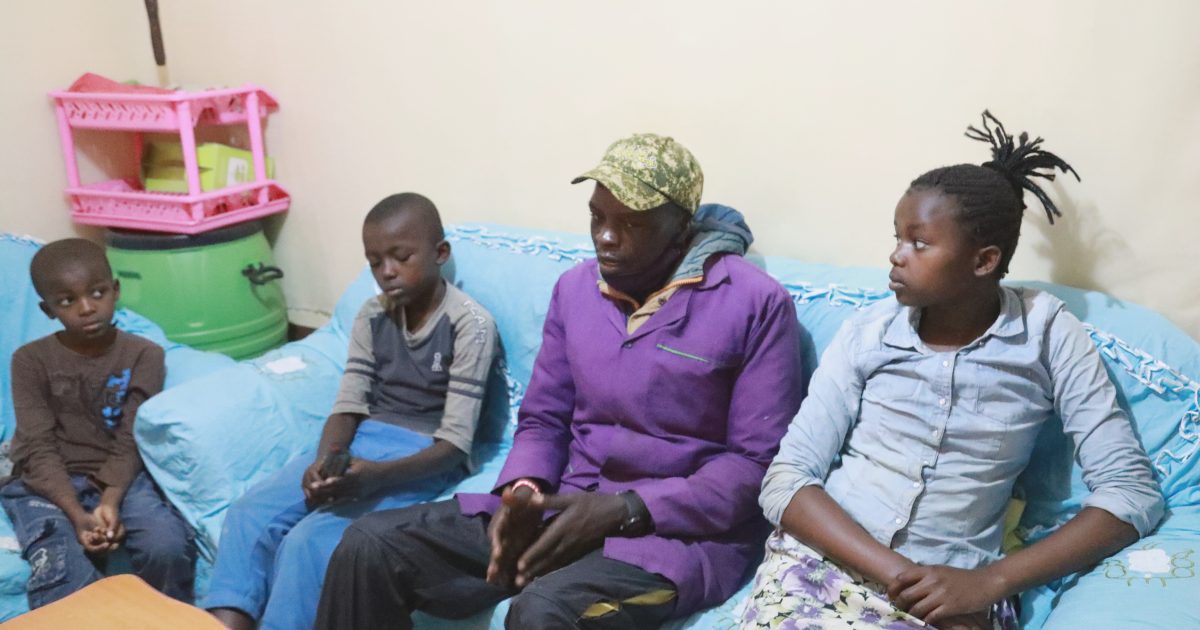Many are the times that Muiruri Koimburi wakes up at 5:00am, but it won’t be until six hours later that he lifts himself off his bed. His body has been failing to respond to his wishes.
Koimburi, a fruit vendor recalls how he once tried his hands at selling apples. “When I touched them, I was unable to do anything with my hands for the next five hours,” he says. The fruits were too cold. His hands became stiff and numb.
The extremely low temperatures under which apples are stored were not friendly to him. He made a switch to watermelons and other fruits that are not much affected by warmer temperatures.
Koimburi keeps cold at bay by having his jacket and overall on most of the time. “I would rather sweat all day than expose myself to the cold,” he says. The memory of the weeks he spent bedridden because of being rained on haunts him.In 2016, the then carpenter started experiencing fatigue when he went to get bananas from Meru. Lifting any load from the ground proved difficult. This forced him to seek medical attention. Physician and rheumatologist Dr. Paul Ekwom has been attending to him since then.
The signs and symptoms of lupus tend to be similar in both gender. Koimburi’s condition required an antinuclear-antibody blood test for the right diagnosis to be arrived at. Six months later, it emerged that he had kidney stones.
Statistics show that one out of every 10 lupus patients is a male and Koimburi is one in this batch living with the autoimmune disease. This is a lifelong condition that he constantly battles.
His legs often swell and his blood pressure drops. Simple tasks such as cleaning his clothes or lifting a 5kg box are strenuous.
“My wife used to help me when we discovered I have lupus. Unfortunately, she died,” he regrets. “Things have been really difficult since then,” the father of three says. His only daughter has taken up cooking duties since direct heat also affects him.
His past experiences are vivid in his mind. “I could be in a lot of pain and I would find myself unable to explain this to another person.” He had to quit formal employment. He would summon his meagre strength and board a bike to take him home to rest.

Dr. Ekwom states, “Lupus is commoner in women but also occurs in men. Incidentally, it’s much more serious when it occurs in men than in women.”
Dr. Ekwom attributes the high percentage of women affected to the role of estrogen. He says diagnosis is not easy.
“Most patients may take a while before the diagnosis is made,” the specialist explains. “The symptoms sometimes do not all occur at the same time. One symptom may occur and the other will take time to occur but the doctor will make a diagnosis based on some of the symptoms and with the help of laboratory tests.”
Managing Koimburi’s condition has been expensive and difficult. He’s dependent on his fruit vending business. By it, he feeds and educates his family. His hospital costs and other bills are met by what he earns from his stand. The cost of managing autoimmune conditions is high.
Koimburi has lost his dream of landing a job as a carpenter due to the unpredictable nature of his health.
Dr. Ekwom is aware that patients rue lost opportunities that result from the ravages of the disease. “Even with insurance, the disease robs you of part of your income. Lupus medication, especially the new ones are very expensive,” he says.
Koimburi has no comprehensive insurance cover. His National Hospital Insurance Fund (NHIF) only caters for medical tests.
“Sometimes I ask myself, will I buy my medicine or will I feed my family? I am a hustler. My business is my only source of income,” he says adding that he buys medicine only when he has money.
The rheumatologist voices concern over some male patients who skip their drugs since this would impact negatively on their health. “It’s important to adhere to treatment. Taking medication controls the disease,” he says, adding, “I have met lupus patients who have successfully worked till retirement with some working post retirement.”
Taking medication every day takes a toll on Koimburi. He contends with the side effects of the medicines that manage his condition; sleep deprivation, mood and anxiety disorders. Stress arising from incurred debt due to the pressure to meet his financial obligations, hasn’t spared him. He suffers deteriorating memory.
“The impact of lupus on women is not less than that of men. In fact, the perception is that it should be less but the impact is the same. This is in terms of mental health, performance, expectation from the community especially now in the age of equality where everyone is expected to put bread on the table,” Dr. Ekwom says.
Koimburi has accepted that the sickness can only be managed but the inconsistency of his health plagues him. Being the breadwinner, his family of three looks up to him. But some days, when he can barely wake up from the bed, his biggest worry is what his children will eat.
There is no data in the country on patients who suffer from autoimmunity. This is attributed to the low prevalence of the disease but according to Dr. Ekwom, the numbers have been rising.
Despite the increase in the number of rheumatologists, the specialists are not enough. Some patients cover long distances in search of treatment.
The fight to get autoimmunity disease recognized and covered by NHIF is being championed by patients and doctors. Dr. Ekwom hopes that one day these patients will be partly if not fully covered by the scheme in order to access medication.
“The government does not consider this disease like cancer, yet it is not one that can be cured,” Koimburi says.
His voice adds to hundreds of other lupus patients who are hoping that their pleas will one day be heeded. For now, Koimburi diligently continues to sell his fruits as he waits for relief.
By Abigail Munene





